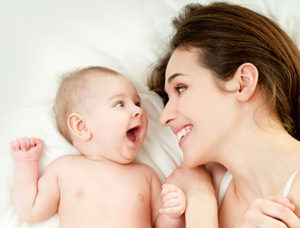Mirror Neurons: Mind Reading 101
 Mom smiles…. Baby copies the expression- and gurgles with glee
Mom smiles…. Baby copies the expression- and gurgles with glee
At a very early age, babies learn to interpret facial expressions by copying those of people around them. Mirror neurons allow babies to experience the emotion associated with the visual input This infantile learning system was essential for the development of empathy and for our survival as a primitive human species: we had to be able to interpret the intentions of other prehistoric humans and react accordingly for self-preservation. This learning has become imprinted in our primitive emotional brain- bypasses our thinking brain- and primes us to respond to the facial expressions of those around us before we have a chance to process it logically, explaining our “gut feelings” about those we meet in work or social circumstances.
Mirror neurons allow babies to experience the emotion associated with the visual input.

| Look at these three pictures: What Are Your Initial Impressions? |
Example # 1

- How would you feel if you went into work and were told that this is your new boss?
- Suppose you saw this person at a party. How likely would you be to approach him?
Key: The furrows between his brows & downturned corners of his mouth convey displeasure, scorn
Example #2

- If energy, enthusiasm, drive, and confidence were desired characteristics for a particular job, how likely would you be to hire this candidate?
Key: Sagging of the lower face and hollows under the eyes suggest fatigue and lack of energy; while her furrowed brows convey a slightly overwhelmed look
Example #3

- Is this a person you’d like to befriend?
- How would you feel if you went into work and were told that this is your new boss?
Key: Lowered brows and narrowed eyes convey irritability while puckering of the mouth suggests a very tense person
| Do we feel uncomfortable when we are around people who display these facial characteristics? Do we unwittingly display them ourselves? |
It’s a sad fact that we prejudge people before we have a chance to get to know them in-depth. Our innate bias will often influence, albeit subconsciously, how we react to them socially, and will influence their success in business and in the workplace.
| What Does Your Face Say About You? |
Tip: Don’t scrutinize your reflection close up in a mirror- that’s not how people see you. Take full-face and profile pictures of yourself. Now you’re getting a more realistic idea of how a third person sees you…Do you see yourself in any of the preceding examples? Would you like to look less angry /tense/ sad/ tired /saggy?
Would you like to make a better impression on people? |
My job as an aesthetic physician is to analyze how your expressive lines, sagging and facial shape contribute to the impression other people have of you, and to restore a more relaxed, refreshed, rejuvenated, attractive and approachable appearance that truly reflects the underlying you.
